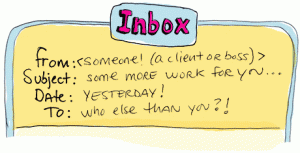Why Email is Awful
You’ve been emailing back and forth with a client about the details of a new job: hours, what you’ll do, what you won’t, and of course, how much you’ll get paid. You think you’ve laid everything out fairly clearly in your last email and are feeling good that this negotiation is (finally) coming to a close.
Just then an email from the client pops up in your inbox. As you read his response, your blood pressure rises and your vision blurs. “This guy is crazy; who does he think he is talking to me like that? I’ll show him! I’ll write the best email he’s ever seen!!1”
Friend, step away from the email machine.
Email is a wonderful tool; I love it and have been using it since I got a Pine account at my local library in the early ’90s. But email has limitations. And one of them is that it is horrible, I repeat: horr-i-ble, at conveying emotion and subtext.
Which means that email is not a good tool to use when your negotiations start getting emotional.
And while you are nodding your head in agreement and you know in your bones that what I’m saying is correct, you will forget this as soon as someone sends you a nasty email. You will want vengeance and validation and a chance to make them realize just how wrong they are.
When Email is Good it is Very Good
Email is terrific for conveying information. Facts, figures, lists, documents. Email is fast and efficient and doesn’t cut you off mid-sentence because you went over an arbitrary character limit.
I often use emails to set the stage in a negotiation or to trade edits of a document back and forth. But the further I get away from communicating pure information, the less helpful email becomes as a communication device.
I know that when I start to talk about the things I really care about in a negotiation, I need to either pick up the phone or go meet with the person face-to-face. No matter how eloquent a writer you think you are (or may be) email is limited in how well it can communicate emotions that sit anywhere between ridiculously happy (!!!!!) and terribly upset 🙁 🙁 :(.
But When Email is Bad, it is Awful
Times when email is not the right tool to use:
— When you’re angry and want to prove a point.
— When your reasoning is complex.
— When a misunderstanding hasn’t been resolved after two exchanges.
— When you get a bigger or harsher reaction to a request than you were expecting.
— When you’re upset by what you’ve been asked to do.
And pretty much any time feelings are high and facts are low.
So what do you do instead of sending an email? Well you need to talk with the person. Using your voice and your ears, and if at all possible, your eyeballs.
The messages conveyed in intonation and body language will be helpful for both of you and can help the misunderstanding from snowballing into the World’s Greatest Disagreement.
That comment you thought was a snide dig? Turns out they just don’t tell jokes very well.
Their impression that you ask an endless number of inane questions? You can show off your sincere curiosity first hand and explain how your questions are related to the negotiation.
But this would be a pretty crappy post if I just said “Email is bad for complex messages, have a conversation instead!,” because there are 942 other sites on the internet that will tell you that.
Here’s how to break yourself of the habit of choosing email over a conversation.
When you get an email that stirs up your emotions, close the browser window and take a five minute break. Breaks during the work day are good for your productivity anyway, but this break is designed to make it harder to tear off a response you’ll regret later.
If after your break you are still upset, keep your browser or email application closed and pull up a word processing program instead. Write your email response there. Then save it in a file marked “Do Not Send.”
Most people like email because they can refine their message and edit it to “perfection.” In a conversation sometimes you forget a point you wanted to make or get backed into a rhetorical corner. So don’t go into the conversation cold.
Write out your interests, why those interests matter to you, why their message upset you and what your back up plan is if the conversation doesn’t work out. Take these notes with you to the conversation. If you get overwhelmed and don’t know what to say, use your notes.
Many people avoid conversations because they want to avoid the conflict, which I totally get. Conflict can be scary. But remember this: when you avoid the conflict, you commit to the problem. If you keep avoiding the conflict, you will keep having the problem. So which do you dislike more? The conflict? Or the problem that is currently driving you crazy?
Finally, responding to a email that gets your hackles up can be satisfying. It gives you the sense that you are doing something to stick up for yourself. Showing restraint doesn’t provide the same level of satisfaction.
So make a point of congratulating yourself when you do show restraint. Tell a friend that you didn’t answer an email that upset you, even though not responding was really hard. Reward yourself with a cup of tea or 10 minutes of goof off time on Twitter. Do something to recognize and celebrate your good behavior.
I know email can be a tempting way of addressing problems when they crop up in a negotiation, but resist the siren song of faceless communication. Be a good negotiation ninja and have a conversation instead. You’ll end up spending less time on the problem and feel better about the conflict in the long run.
Categories: Dealing with People







